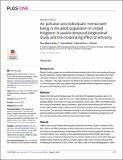Files in this item
Air pollution and individuals’ mental well-being in the adult population in United Kingdom : a spatial-temporal longitudinal study and the moderating effect of ethnicity
Item metadata
| dc.contributor.author | Abed Al Ahad, Mary | |
| dc.contributor.author | Demšar, Urška | |
| dc.contributor.author | Sullivan, Frank | |
| dc.contributor.author | Kulu, Hill | |
| dc.date.accessioned | 2022-03-10T10:30:25Z | |
| dc.date.available | 2022-03-10T10:30:25Z | |
| dc.date.issued | 2022-03-09 | |
| dc.identifier | 278225380 | |
| dc.identifier | 2a6fa1f5-bf21-4136-a460-59a0a998cc40 | |
| dc.identifier | 85126078310 | |
| dc.identifier | 000804638700015 | |
| dc.identifier.citation | Abed Al Ahad , M , Demšar , U , Sullivan , F & Kulu , H 2022 , ' Air pollution and individuals’ mental well-being in the adult population in United Kingdom : a spatial-temporal longitudinal study and the moderating effect of ethnicity ' , PLoS ONE , vol. 17 , no. 3 , e0264394 . https://doi.org/10.1371/journal.pone.0264394 | en |
| dc.identifier.issn | 1932-6203 | |
| dc.identifier.other | RIS: urn:CF02898CE69A59BEF4FE1BBBAB1B7B00 | |
| dc.identifier.other | ORCID: /0000-0001-7791-2807/work/109766652 | |
| dc.identifier.other | ORCID: /0000-0001-8808-0719/work/109766747 | |
| dc.identifier.other | ORCID: /0000-0002-9006-730X/work/109766891 | |
| dc.identifier.other | ORCID: /0000-0002-6623-4964/work/109766748 | |
| dc.identifier.uri | https://hdl.handle.net/10023/25020 | |
| dc.description | This paper is part of a PhD project that is funded by the St Leonard’s PhD scholarship, University of St Andrews, Scotland, United Kingdom. | en |
| dc.description.abstract | Background Recent studies suggest an association between ambient air pollution and mental well-being, though evidence is mostly fragmented and inconclusive. Research also suffers from methodological limitations related to study design and moderating effect of key demographics (e.g., ethnicity). This study examines the effect of air pollution on reported mental well-being in United Kingdom (UK) using spatial-temporal (between-within) longitudinal design and assesses the moderating effect of ethnicity. Methods Data for 60,146 adult individuals (age:16+) with 349,748 repeated responses across 10-data collection waves (2009–2019) from “Understanding-Society: The-UK-Household-Longitudinal-Study” were linked to annual concentrations of NO2, SO2, PM10, and PM2.5 pollutants using the individuals’ place of residence, given at the local-authority and at the finer Lower-Super-Output-Areas (LSOAs) levels; allowing for analysis at two geographical scales across time. The association between air pollution and mental well-being (assessed through general-health-questionnaire-GHQ12) and its modification by ethnicity and being non-UK born was assessed using multilevel mixed-effect logit models. Results Higher odds of poor mental well-being was observed with every 10μg/m3 increase in NO2, SO2, PM10 and PM2.5 pollutants at both LSOAs and local-authority levels. Decomposing air pollution into spatial-temporal (between-within) effects showed significant between, but not within effects; thus, residing in more polluted local-authorities/LSOAs have higher impact on poor mental well-being than the air pollution variation across time within each geographical area. Analysis by ethnicity revealed higher odds of poor mental well-being with increasing concentrations of SO2, PM10, and PM2.5 only for Pakistani/Bangladeshi, other-ethnicities and non-UK born individuals compared to British-white and natives, but not for other ethnic groups. Conclusion Using longitudinal individual-level and contextual-linked data, this study highlights the negative effect of air pollution on individuals’ mental well-being. Environmental policies to reduce air pollution emissions can eventually improve the mental well-being of people in UK. However, there is inconclusive evidence on the moderating effect of ethnicity. | |
| dc.format.extent | 1997105 | |
| dc.language.iso | eng | |
| dc.relation.ispartof | PLoS ONE | en |
| dc.subject | G Geography (General) | en |
| dc.subject | BF Psychology | en |
| dc.subject | 3rd-DAS | en |
| dc.subject.lcc | G1 | en |
| dc.subject.lcc | BF | en |
| dc.title | Air pollution and individuals’ mental well-being in the adult population in United Kingdom : a spatial-temporal longitudinal study and the moderating effect of ethnicity | en |
| dc.type | Journal article | en |
| dc.contributor.institution | University of St Andrews. Population and Health Research | en |
| dc.contributor.institution | University of St Andrews. School of Geography & Sustainable Development | en |
| dc.contributor.institution | University of St Andrews. Population and Behavioural Science Division | en |
| dc.contributor.institution | University of St Andrews. Environmental Change Research Group | en |
| dc.contributor.institution | University of St Andrews. Bell-Edwards Geographic Data Institute | en |
| dc.contributor.institution | University of St Andrews. School of Medicine | en |
| dc.contributor.institution | University of St Andrews. Sir James Mackenzie Institute for Early Diagnosis | en |
| dc.identifier.doi | 10.1371/journal.pone.0264394 | |
| dc.description.status | Peer reviewed | en |
This item appears in the following Collection(s)
Items in the St Andrews Research Repository are protected by copyright, with all rights reserved, unless otherwise indicated.

